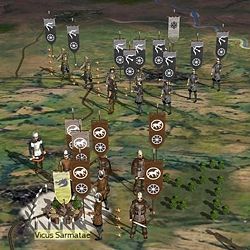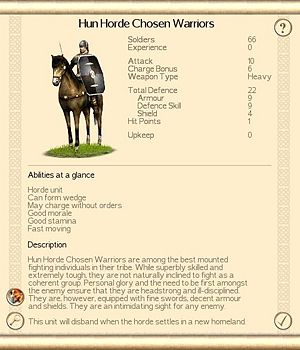Hordes
Hordes are an important aspect of Rome: Total War: Barbarian Invasion. The presence of hordes significantly alters gameplay.
In Rome: Total War, if the last settlement a faction owned was captured, the faction would be destroyed. In Barbarian Invasion, certain factions now have the ability to up and leave, taking as much of its people with them to find a new home.
This effectively allows the faction to survive, and continue to remain a threat to the player.
Contents
Historical Overview
The time period that Barbarian Invasion covers - 363 AD to 476 AD - is considered by historians to be the first phase of the Migration Period, where various "barbarian" peoples settled in Western Europe. Many would go on to establish lasting kingdoms in the former Roman Empire. There are several different reasons given for the Migration: population pressures, climate change, and, of course, the expansion of the Huns. Hordes in the game represent these great migrations, which laid the foundation of modern Europe.
Gameplay
Forming a Horde
A horde can be formed in three ways:
- If a faction is down to one settlement, it can choose to abandon it and form a horde.
- A faction can lose its last settlement and be forced to form a horde.
- A faction can start the game as a horde.
Managing a Horde
Factions that are a horde have a wheel on their army banners to show they are on the move. When a horde is formed, many new units are created. Some of these can retrained, but most are "horde" units, identified by a wheel icon in their unit card. They will disband when the horde finds a new homeland. This is crucial, as these units will form a part of the new homeland, decreasing dissent in the new settlement.
There is no army upkeep when playing as a horde, but you cannot retrain units unless you settle down - in which case, a number of horde units will be lost. Mercenaries, however, will need to be paid. You cannot recruit agents, armies or navies as a horde. There is no income as horde - money can only be made by sacking settlements.
Sacking and Settling
When a horde captures a settlement, it can either sack it or settle there. "Sacking" the city results in the deaths of thousands of its citizens, the destruction of many buildings, and a large cash bonus for yourself. The settlement becomes a rebel province. You will have to wait a while to sack the settlement again, because there won't be anything of value.
If you choose to settle, little money is made, no one is killed, and half your horde units are disbanded. Once you conquer a second province, one half of your remaining horde units are disbanded, and when you conquer a third province, all remaining horde units are disbanded, and your faction has found a new "homeland".
At this point the faction has reverted to normal, though it can form a horde again if the need arises.
Advantages
- Huge forces under control
- No need to pay upkeep
- Can sack cities for a massive amount of money
- Allows faction to survive after loss of last settlement
- Can travel huge distances across the map, allowing factions to reach their desired provinces much faster (for example, the Vandals start the game in modern-day Russia, but the provinces they need to win are in Spain and North Africa!)
Disadvantages
- Cannot retrain units.
- Horde units disband when settling.
- No fixed income.
- Must continue to pay mercenaries.

